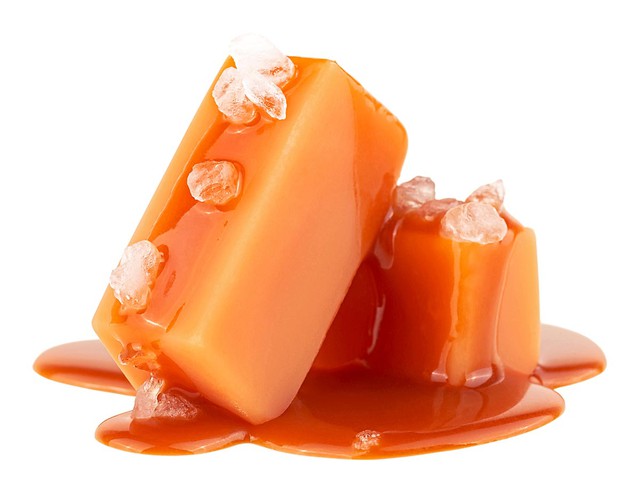
A file photo of caramel confection topped with salt. Photo: Jiji Press
The tendency is more pronounced among people with chronic kidney disease, or CKD, underscoring the need for salt reduction that takes the effect of sweetness into account.
The findings were published in British magazine Scientific Reports in July.
The research team studied how sweetness affects aversion to high salt concentrations, based on the fact that mammals tend to prefer low salt levels and avoid high ones.
A group of healthy individuals and a group of CKD patients participated in the research.
Participants from both groups were asked to hold two types of filter paper in their mouths for three seconds.
One of the two contains only salted water, and the other salted water plus 80 pct sugared water.
With the salt concentration changed in the research, 32 pct of healthy participants showed aversion at five pct salinity, slightly higher than that of seawater, which is around three pct. When sugared water was added, the aversion rate dropped to 17 pct.
At 10 pct salinity, 45 pct of the participants showed aversion without sugared water, compared with 25 pct with sweetness.
Among the CKD patients, whose sense of salty taste is dull, only 15 pct reacted to 10 pct salinity without sugar. The aversion rate dropped further to three pct when sweetness was added.
At 20 pct salinity, higher than that of soy sauce, which is around 15 pct, the aversion rate was 21 pct with only saltiness, and fell to eight pct with the addition of sweetness.
"Sweet-and-salty foods may make people unknowingly consume excessive amounts of salt, so caution is needed," Tetsuro Kusaba, assistant professor at the university's nephrology department, said.
"Reducing sweetness can improve sensitivity to salty taste and help cut salt intake."

https://jen.jiji.com



Max: 1500 characters
There are no comments yet. Be the first to comment.